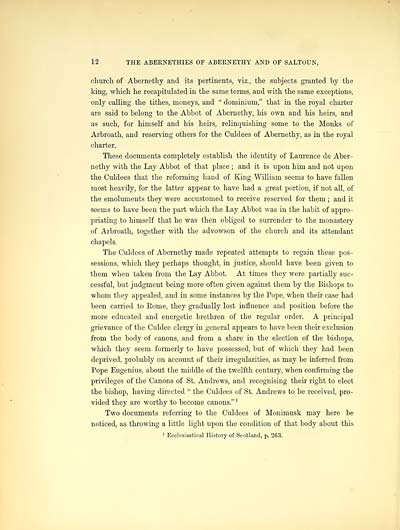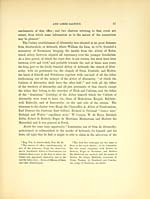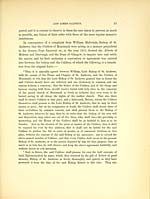Frasers of Philorth > Volume 2
(26)
Download files
Complete book:
Individual page:
Thumbnail gallery: Grid view | List view

12 THE ABEENETH1ES OF ABEENETHY AND OF SALTOUN,
church of Abernethy and its pertinents, viz., the subjects granted by the
king, which he recapitulated in the same terms, and with the same exceptions,
only calling the tithes, moneys, and " dominium," that in the royal charter
are said to belong to the Abbot of Abernethy, his own and his heirs, and
as such, for himself and his heirs, relinquishing some to the Monks of
Arbroath, and reserving others for the Culdees of Abernethy, as in the royal
charter.
These documents completely establish the identity of Laurence de Aber-
nethy with the Lay Abbot of that place ; and it is upon him and not upon
the Culdees that the reforming hand of King William seems to have fallen
most heavily, for the latter appear to have had a great portion, if not all, of
the emoluments they were accustomed to receive reserved for them ; and it
seems to have been the part which the Lay Abbot was in the habit of appro-
priating to himself that he was then obliged to surrender to the monastery
of Arbroath, together with the advowson of the church and its attendant
chapels.
The Culdees of Abernethy made repeated attempts to regain these pos-
sessions, which they perhaps thought, in justice, should have been given to
them when taken from the Lay Abbot. At times they were partially suc-
cessful, but judgment being more often given against them by the Bishops to
whom they appealed, and in some instances by the Pope, when their case had
been carried to Borne, they gradually lost influence and position before the
more educated and energetic brethren of the regular order. A principal
grievance of the Culdee clergy in general appears to have been their exclusion
from the body of canons, and from a share in the election of the bishops,
which they seem formerly to have possessed, but of which they had been
deprived, probably on account of their irregularities, as may be inferred from
Pope Eugenius, about the middle of the twelfth century, when confirming the
privileges of the Canons of St. Andrews, and recognising their right to elect
the bishop, having directed " the Culdees of St. Andrews to be received, pro-
vided they are worthy to become canons." J
Two documents referring to the Culdees of Monimusk may here be
noticed, as throwing a little light upon the condition of that body about this
1 Ecclesiastical History of Scotland, p. 263.
church of Abernethy and its pertinents, viz., the subjects granted by the
king, which he recapitulated in the same terms, and with the same exceptions,
only calling the tithes, moneys, and " dominium," that in the royal charter
are said to belong to the Abbot of Abernethy, his own and his heirs, and
as such, for himself and his heirs, relinquishing some to the Monks of
Arbroath, and reserving others for the Culdees of Abernethy, as in the royal
charter.
These documents completely establish the identity of Laurence de Aber-
nethy with the Lay Abbot of that place ; and it is upon him and not upon
the Culdees that the reforming hand of King William seems to have fallen
most heavily, for the latter appear to have had a great portion, if not all, of
the emoluments they were accustomed to receive reserved for them ; and it
seems to have been the part which the Lay Abbot was in the habit of appro-
priating to himself that he was then obliged to surrender to the monastery
of Arbroath, together with the advowson of the church and its attendant
chapels.
The Culdees of Abernethy made repeated attempts to regain these pos-
sessions, which they perhaps thought, in justice, should have been given to
them when taken from the Lay Abbot. At times they were partially suc-
cessful, but judgment being more often given against them by the Bishops to
whom they appealed, and in some instances by the Pope, when their case had
been carried to Borne, they gradually lost influence and position before the
more educated and energetic brethren of the regular order. A principal
grievance of the Culdee clergy in general appears to have been their exclusion
from the body of canons, and from a share in the election of the bishops,
which they seem formerly to have possessed, but of which they had been
deprived, probably on account of their irregularities, as may be inferred from
Pope Eugenius, about the middle of the twelfth century, when confirming the
privileges of the Canons of St. Andrews, and recognising their right to elect
the bishop, having directed " the Culdees of St. Andrews to be received, pro-
vided they are worthy to become canons." J
Two documents referring to the Culdees of Monimusk may here be
noticed, as throwing a little light upon the condition of that body about this
1 Ecclesiastical History of Scotland, p. 263.
Set display mode to:
![]() Universal Viewer |
Universal Viewer | ![]() Mirador |
Large image | Transcription
Mirador |
Large image | Transcription
Images and transcriptions on this page, including medium image downloads, may be used under the Creative Commons Attribution 4.0 International Licence unless otherwise stated. ![]()
| Histories of Scottish families > Frasers of Philorth > Volume 2 > (26) |
|---|
| Permanent URL | https://digital.nls.uk/96570568 |
|---|
| Attribution and copyright: |
|
|---|---|
| Description | A selection of almost 400 printed items relating to the history of Scottish families, mostly dating from the 19th and early 20th centuries. Includes memoirs, genealogies and clan histories, with a few produced by emigrant families. The earliest family history goes back to AD 916. |
|---|

